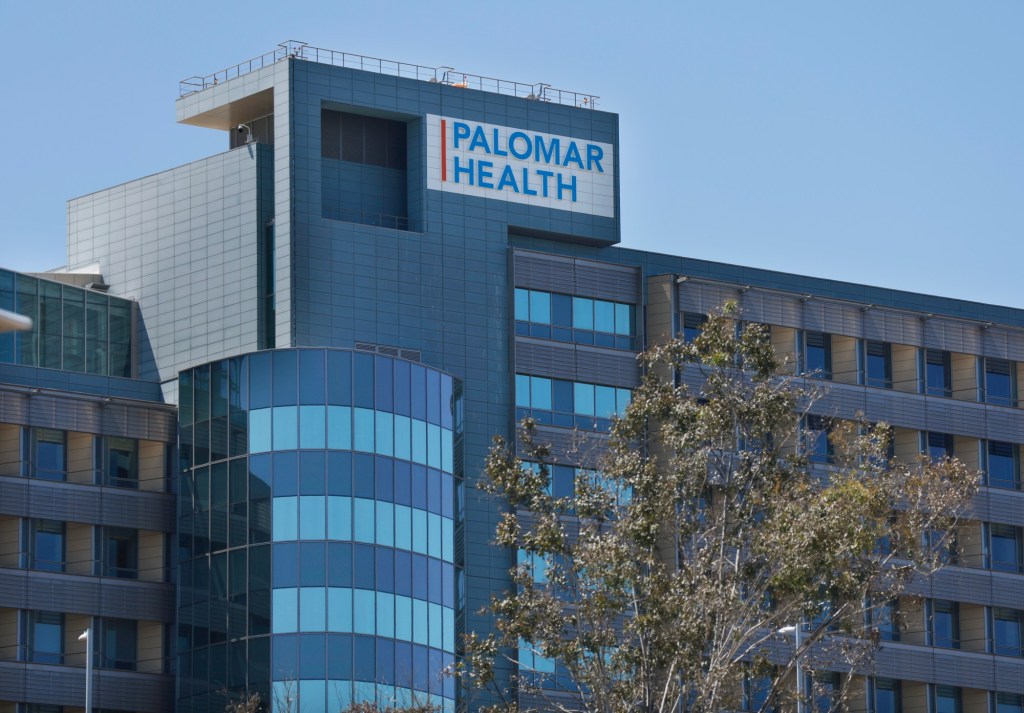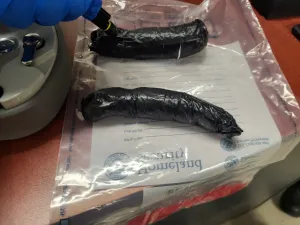

Already starved for cash, Palomar Health faces a demand from Sharp HealthCare to immediately repay $26 million — the principal and interest on a loan — or face a lawsuit alleging that it violated the terms of an exclusive negotiating agreement between the two parties.
Palomar’s elected board of trustees met in closed session Thursday to discuss “significant exposure to litigation,” but reported no votes taken behind closed doors. A Sharp spokesman said Thursday evening that the medical provider will sue as it has not received repayment of the $25 million it loaned Palomar on March 29, 2024, plus interest.
A March 17 letter from Sharp to Diane Hansen, Palomar’s chief executive officer, obtained by The San Diego Union-Tribune accuses the North County medical provider of violating a confidentiality and nondisclosure agreement between the two parties when the public health care district’s board approved receiving a $20 million loan from UC San Diego Health on March 7.
Sharp’s letter indicates that it was working with Palomar on a joint powers agreement that would have called for Sharp and Palomar to “undertake the joint management and strategy for all of Palomar’s business and financial operations, wherever located, for an initial term of 10 years and to create a joint operating committee with equal representation from each party to be responsible for the day-to-day management, direction, oversight, administration and execution of the arrangement.”
Sharp indicates that it was willing to provide total funding of up to $75 million following the execution of the joint powers agreement.
Though an existing exclusive negotiating agreement between the parties forbade talking to other organizations about similar deals, Sharp’s letter indicates that just such a conversation was ongoing between Palomar and the university health system to enter into “a proposed transaction for all of its facilities and business operations with UCSD Health.”
UC San Diego Health officials declined to comment on the matter Thursday.
In a March 22 letter obtained by The San Diego Union-Tribune, Palomar responds to Sharp’s allegations of negotiating in bad faith, saying that its loan from UCSD was “no strings attached,” noting that the university, in a news release, cited altruistic rather than business reasons for its decision to loan Palomar $20 million.
Palomar indicates that while it did discuss working with UCSD on a “joint affiliation arrangement” regarding its medical campus in Poway, it did so only after notifying Sharp, which agreed through a “written waiver.”
Sharp’s letter mentions a term sheet it sent to Palomar that would have been the start of a joint powers agreement. Palomar’s rebuttal calls the proposal “very thin, and overdue” and states that the local health care giant “continued to drag its feet in submitting a proposal to Palomar” at a time when the organization desperately needed a cash infusion “in the range of $100 (million) to $200 (million).”
Palomar flatly denies Sharp’s allegation that the UC San Diego Health loan was part of a larger affiliation deal in contravention of the existing exclusive negotiating agreement.
“The purpose of the loan was to enable Palomar to continue providing critical medical care to patients in the San Diego region,” Palomar’s letter said.
In a statement sent Thursday afternoon, Sharp calls Palomar’s version of events a “mischaracterization of the facts regarding the many offers of support extended by Sharp to Palomar Health over the past 12 months.”
Sharp further notes that it has a proven track record of nurturing a public district hospital, having leased and operated Grossmont Hospital in La Mesa from the Grossmont Healthcare District for 30 years, a period in which the East County medical campus has grown significantly. Similar plans to expand service lines “such as cardiology, trauma, oncology and women’s health” were planned for Palomar.
“Those proposals included physicians affiliated with Sharp who would perform medical services at Palomar and in its service area to allow for the retention of patient care at Palomar that was otherwise leaving the community, most frequently to UCSD or Scripps,” Sharp’s statement said.
While Palomar’s March 22 letter indicates that it is still willing to work with Sharp, that does not appear likely.
“Faced with this unfortunate set of circumstances, Sharp elected to cease its discussions with Palomar and will instead explore other opportunities,” Sharp’s statement says.
As these negotiations were ongoing behind closed doors, Palomar’s financial condition continued to worsen. Like many hospitals nationwide, the public health care district has struggled with increased labor and supply costs and has seen better-paying business from private health insurance companies wane, especially since Kaiser Permanente opened a new hospital in San Marcos.
After violating financial covenants for more than $700 million in revenue bonds, Palomar was forced to sign a forbearance agreement with lenders, committing to hire outside consultants and create a turnaround plan.
A financial report published this week shows an operating loss of $56 million from July 2024 through February 2025, though that total includes $52 million in depreciation and amortization expenses, which are not cash costs.
Cash is what matters most to bond holders, and here Palomar reports having $41.8 million in “cash and cash equivalents” as of Feb. 28. Palomar’s bond covenants require it to keep a reserve large enough to cover 65 days of its operation, but the financial report states that just 15.4 days were available as of the end of February, 5.2 fewer than in January. It was not clear whether this accounting includes the $20 million loan from UC San Diego.
A financial presentation delivered to Palomar’s finance committee this week states that the organization is making progress in improving its numbers. Total discharges home after treatment, for example, were reported to be up 10 percent over budget and the health system’s average daily census, which indicates the average number of adults in hospital beds each day, was up 9.4 percent compared to the same July-through-February span last year. Revenue is also up compared to last year, but is still not meeting budget projections.
Net revenue is up from $533 million last fiscal year to $564 million this year, though expenses are also up from $564 million last year to $587 million. Palomar’s budget projects $589 million in revenue and $593 million in expenses through February.





